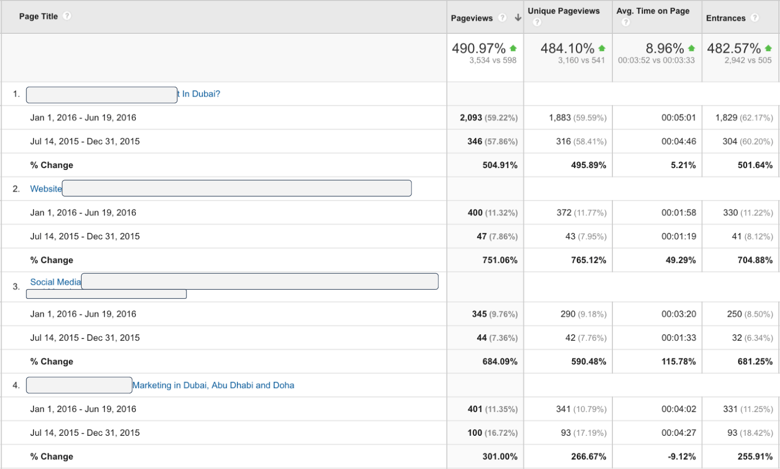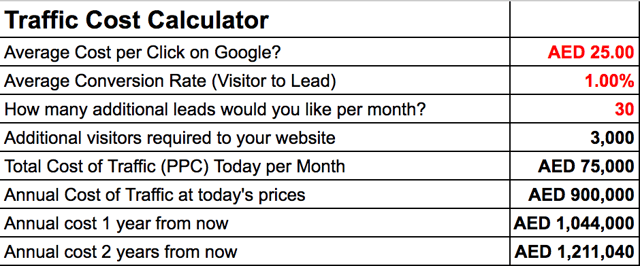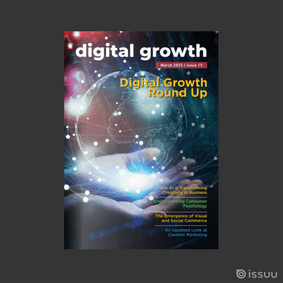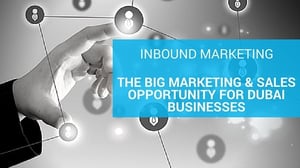 As the founder and CEO of Digital Marketing Agency, part of my role is to drive the business forward by identifying new product and service lines and building the teams around those to ensure service and delivery. I therefore have a slightly privileged position from which to speak about the latest trends and innovations that impact my industry and more importantly, our clients. Over the last two years, my agency has been working on a new service line that primarily, was driven from the US and specifically by a software company called HubSpot. This service is called Inbound Marketing and in many ways is a branch of Content Marketing.
As the founder and CEO of Digital Marketing Agency, part of my role is to drive the business forward by identifying new product and service lines and building the teams around those to ensure service and delivery. I therefore have a slightly privileged position from which to speak about the latest trends and innovations that impact my industry and more importantly, our clients. Over the last two years, my agency has been working on a new service line that primarily, was driven from the US and specifically by a software company called HubSpot. This service is called Inbound Marketing and in many ways is a branch of Content Marketing.
During this time, I've realised one thing. Inbound Marketing is so incredibly powerful, that every business, no matter how big or small, should be engaging in this marketing methodology. But they aren't. Many aren't even aware that Inbound Marketing or the principles behind it exist. Many of these companies retain advertising, marketing (digital or traditional) and PR agencies and have never been informed about Inbound Marketing. How (and why) does this happen?
What is Inbound Marketing?
Inbound Marketing (according to HubSpot) counters the old outbound marketing methods of buying ads, buying email lists, and "praying" for leads, and instead, focuses on creating quality content that pulls people toward your company and product, where they naturally want to be. HubSpot further define Inbound Marketing as being about using marketing to bring potential customers to you, rather than having your marketing efforts fight for their attention. Sharing is caring and inbound marketing is about creating and sharing content with the world. By creating content specifically designed to appeal to your dream customers, inbound attracts qualified prospects to your business and keeps them coming back for more.
In many respects, Inbound Marketing is the type of marketing that EVERY company (new and old, big and small) would implement if (a) they knew that Inbound Marketing as a concept actually existed and (b) they were looking to build a long-term, sustainable and successful business.
Businesses today, increasingly question marketing ROI and while this is virtually impossible to track from offline marketing, Inbound Marketing offers a clear line between your marketing efforts, the number of qualified leads sales generated and revenue. For marketers, Inbound Marketing is the very thing that got traditional marketers like myself fascinated by the internet and the impact of the world wide web on how businesses market their brands, products and services. This is dream ticket stuff.
How many businesses engage in Inbound Marketing?
Like many digital marketing trends, much of the early success of Inbound Marketing has been driven from the US and Europe. Globally, there are approximately 10,000 HubSpot customers. In the entire GCC region, there are less than 70 customers, which indicates that the Middle East as a whole needs to play catch up and at the very least investigate if Inbound Marketing and the HubSpot Inbound Marketing platform will help their businesses to grow and retain their client bases.
So, why don't companies know about Inbound Marketing?
Honestly, we're not sure. But we believe that there are 4 main reasons as to why companies aren't being educated by their marketing partners:
- Advertising, Marketing & PR Agencies in the region simply aren't up to speed with the latest global trends and as a consequence, their clients aren't being advised about the benefits of Inbound Marketing.
- Advertising, Marketing and PR Agencies are aware of Inbound Marketing but don't have the capabilities of offering this as a service and therefore make a decision not to advise their clients of this or other similar opportunities.
- The "If it isn't broken, don't fix it" mentality. This is a common problem in this region and is probably why brands continue to spend $$$$$$ on full page adverts in newspapers and magazines that very few people actually read.
- Inbound Marketing has a long-term impact for clients that may reduce their reliance on on-going marketing, advertising and PR activities.
The Long Term Impact of Inbound Marketing - is this an issue?
Not for businesses it isn't.
But traditionally, advertising, marketing and PR agencies have built their businesses on "need". The need for constant and on-going support. The advertising industry in particular has been built on the basis that everything they do for a client has an "expiry date". For example, newspaper adverts are virtually redundant after a day. Magazine adverts after a week or month at most. Radio adverts last just a few seconds. Therefore, businesses need to re-engage their agencies and launch a regular stream of campaigns, which in turn creates a regular stream of work.
That's where Inbound Marketing differs.
Inbound Marketing agencies typically provide the following services:
- Content Creation
- Blog Articles
- E-Books and White Papers
- Video and Audio
- Landing Pages
- Marketing and Content Distribution Services
- Activities to make sure that the correct audience (i.e. potential customers) see the content that has been created.
All of the above content is hosted online. This therefore means that unless a company decides to remove this content, it remains available to potential customers on the internet at all times.
This may not seem significant, but it really is!
As the unofficial gatekeeper of the Internet, Google plays a significant role in the success and failure of businesses online. If Google trusts your business (or domain and website), there is a very high chance that your company will "out-rank" a competitor who Google trusts less. There is a degree of uncertainty when it comes to the process that Google implements to decide who it trusts, but one part of this that is certain, is that Google absolutely loves websites (and businesses) that create on-going and regular content that help other internet users. Those loved websites get rewarded handsomely, with high rankings and website traffic that can create sales and business opportunities.
Inbound Marketing has a strong tie to Google. By creating a regular stream of content (the type that helps answer the questions that your potential customers may have), Google will start to increase its trust in your business (and website). Over time, if this activity continues, the trust in your business increases, which in turn increases the Google ranking for your website, service and product pages as well as other important website page that may drive business to you. Here's an example that helps to explain this:

The 4 examples above are pieces of content that have been created by Nexa for our own business. Based on the Google Analytics information shown, the volume of traffic to these pages has been split into 2 date ranges with the exact time in between:
- July 14th - December 31st 2015
- January 1st - June 19th 2016
What has happened:
- Based on the on-going strategy of creating regular content for the business, the traffic of the website has increased substantially.
- For those 4 pages alone, traffic has grown by almost 500% during this period.
- The number of leads generated from those visits increased from 31 (July to December 2015) to 129 (January to June 2016)
- Revenue generated: US$ 94,500+
This is great, but what happens once this content get "old"?
This is where it gets interesting! As you can see, content that was created and posted over a year ago actually generated more traffic, leads and revenue after 6 months. Let's examine this further.
If we reduce the date range to just the last 2 months compared to the previous 2 for the top piece of content, lets see the impact:

The holy month of Ramadan (mid-June to mid-July) was a part of this test, where business hours and general business activity in greatly reduced in the region. Despite this, as you can see, monthly visits to the page increased together with page entrances and average time spend on the page.
What does this mean?
There is one main reason for this. Google is now ranking this page on more than 1 search result. We have verified this and have found that this one web page is now ranking in position number 1 for over 25 searches! That means that whoever is searching for something related to this topic, is being directed (by Google) to our content.
So what's happening here? The simple answer is that Google is driving more and more traffic to our website as our trust has increased. Think about it. Google is a business and as a business wants satisfied customers. Satisfied customers are those who are searching for something on Google and find exactly what they need in the shortest time frame possible. Google believes that by showing this article at the top of multiple search results, they are providing the best possible answer to those in search of it.
Ok, I think I get it - but how will this impact my business on a long-term basis?
Well, that's actually much simpler than it seems and at this stage, lets bring in some numbers. From the content created on my website (lets only look at the Blog section for now), we have generated the below:

Since January, we have generated almost 21,000 (un-paid) website visits to our website from a variety of channels. From these over 200 leads have also come through to our business development team.
To truly understand the value of this traffic, we should look at the following:
- The cost of traffic and
- Average cost per lead
- Revenue generated for the business
- Lifetime value of each client that came from one of these leads.
For now, let's just look at the cost of traffic as the website traffic generated is what drives the 200+ business leads generated so far this year. It's also actually not too difficult to place a value on website traffic as Google provide much of this information and charges its advertisers on a cost-per-click basis.
In our industry the following is relevant:
- Google Cost per Click for products such as Social Media, Website and SEO services = AED 20-30 per click. Lets use AED 25 per click as the basis of our calculations.
- Based on my traffic to lead conversion rate, (212 leads from 20,920 visits) our current conversion rate to Blog traffic is around 1% (remember, this only includes blog traffic, the conversion rates differ for different parts of the website). From the first 7 months of 2016, the 212 leads so far equates to around 30 leads per month.
We can now use the above to make some calculations:

Based on the above, we can see that if my organic blog traffic was zero, it would cost me AED 75,000 ($20,400) per month to generate the traffic needed to generate 30 leads per month. Annually, this equates to AED 900,000 ($244,897).
In the UAE, the average Cost per Click (CPC) on Google is higher than anywhere else in the world with the average CPC increasing year on year. Our internal data shows that this increase is approximately 16% annually, which also therefore impacts the cost of traffic needed in the future by businesses. Based on this, 2 years from now, if our business still required 30 leads per month, we would require an investment of over AED 1 million ($284,000).
So the Long Term Effect of Inbound Is...
Significant. As we have seen, the content created during the Inbound Marketing process has a long-lasting effect. In reality, what this means is that if your company engages a Inbound Marketing Specialist (such as Nexa) to create and implement this strategy for you, the effects of what we do will out last our work with you.
Outlast? Really?
Yes. As you can see above, an article created early in 2015, drives more traffic to our website today than it did 6 months or even 2 months ago. We therefore assume that this will continue in the short to medium term. The significance of this is that in 2, 3 or 4 years from now, businesses will continue to reap the benefits of Inbound Marketing activities even if they are no longer engaging an agency.
And that is one of the main reasons as to why agencies are scared to tell their clients about Inbound Marketing. Clients will continue to properwithout them and possibly won't need them in the future.
Inbound Marketing. Clients will continue to properwithout them and possibly won't need them in the future.
If you are in a competitive industry and are struggling to differentiate your business against competitors, the Inbound Marketing methodology is one that you should seriously consider.
Other advantages of Inbound Marketing:
- Your business becomes much more visible, not only to potential customers, but also future employees and competitors.
- Allows you to become a thought-leader in your industry by sharing thoughts, insights and other information.
- Gives you much more control of your marketing efforts.
- Reduce wasted advertising that has an "expiry date"
- Build an asset. If you rank number 1 on Google for many important search terms - how much will this impact the value of your business?
If you're interested in looking at Inbound Marketing and HubSpot for your business, complete the form on this page or click on the button below:
%20(1).png?width=2701&height=607&name=BRC_NEXA_LOGO_BLACK%20%26%20VIOLET%20(1)%20(1).png)
%20(1).png?width=2701&height=607&name=BRC_NEXA_LOGO_WHITE%20(2)%20(1).png)
















Comments